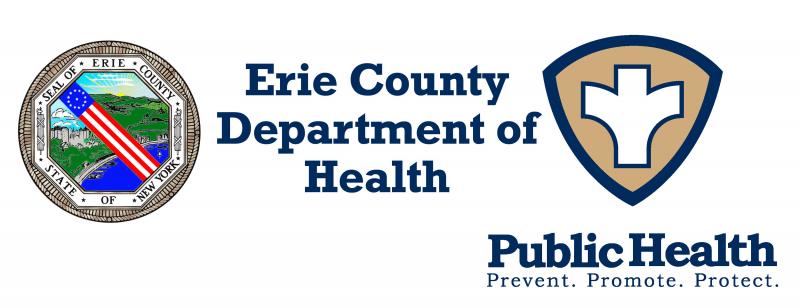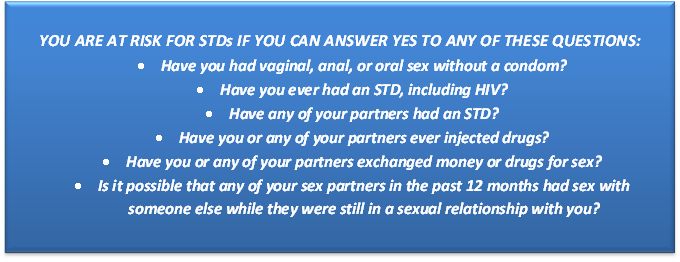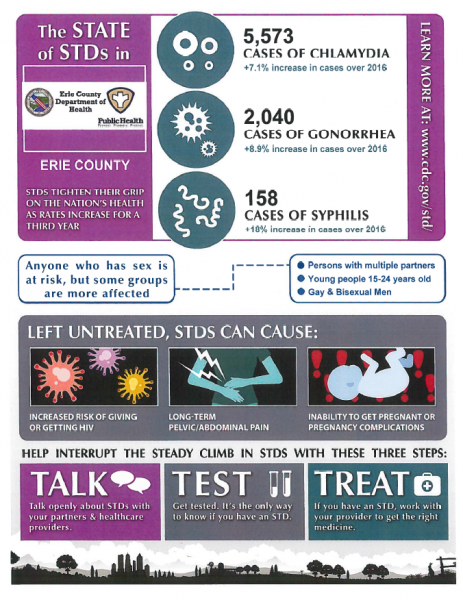Modified: March 29, 2018 3:02pm
Latest News

PRESS RELEASE
From the Office of the Commissioner of Health, Dr. Gale R. Burstein
Date: March 29, 2018
CONTACT: Mary C. St. Mary/Mary.StMary@Erie.Gov
Phone: 716.858.4941/ Mobile: 716.253.3925
April is National STD Awareness Month
Confidential STD Testing Provided at 608 William Street (Buffalo) Clinic
ERIE COUNTY, NY—During April, STD (sexually transmitted disease) Awareness Month, the Centers for Disease Control and Prevention (“CDC”) and health departments across the country are reaching out to healthcare providers and patients alike with an important message: Treat Me Right. This year, the focus is on the importance of a strong healthcare provider-patient relationship and how that relationship can contribute to effective STD prevention.
At a time when STDs are at a record high, it has never been more important to protect your patients’ sexual health as a healthcare provider, or to stand up for your own sexual health as a patient. Patients should take charge of their sexual health, know how to stay safe and healthy and how to directly ask their healthcare provider for the care that they need and deserve. For healthcare providers, this involves fostering a trusting patient-provider relationship and ensuring patients are correctly diagnosed and treated.

Dr. Gale Burstein, Commissioner, Erie County Department of Health said: “Despite the fact sexually transmitted infections (“STI”) remain a serious public health threat, the topic is rarely discussed in home or school settings. Data from the CDC indicate there is a hidden STI epidemic in the United States with an estimated 20 million new STIs occurring each year”.
When visiting a healthcare provider, patients should discuss sex as it relates to their health. Certain healthcare providers may not discuss sex or STI testing with you. Patients should bring it up if their healthcare provider does not, arm themself with the facts, and know what to expect. Your healthcare provider will take a “sexual history” which helps them to understand what STI tests you may need. Here are examples of questions you should expect and be prepared to answer honestly:
- Have you been sexually active in the last year?
- Do you have sex with men, women, or both?
- In the past 12 months, how many sexual partners have you had?
- Do you have anal, oral, or vaginal sex?

Erie County, along with the entire U.S., continues to have a high number of STIs. Syphilis, once nearing elimination unfortunately is now thriving. Reported primary and secondary syphilis cases and rates are at a 20-year national high. Cases of both chlamydia (+7.1%) and gonorrhea (+8.9%) increased from 2016 to 2017 in Erie County.
STIs affect individuals of all ages, but they take a particularly heavy toll on young people. CDC estimates that youth ages 15-24 years old make up 25% of the sexually active population, but account for 50% of the 20 million new STIs that occur each year. The bottom line is: if you are having sex, you can get a sexually transmitted infection.
Many STIs are curable and all are treatable. STI screening and early diagnoses are essential in preventing transmission and the potential long term health consequences. Effective prevention strategies include abstaining from sex, reducing the number of sexual partners, and consistently and correctly using condoms. Effective vaccines are available to prevent hepatitis B and nine types of the human papillomavirus (“HPV”) that cause disease and cancer. For all sexually active individuals, particularly young people, STI screening and prompt treatment (if infected) are critical to protect a person’s health and prevent transmission to others. For confidential STI screening or any additional comprehensive sexual health care services, contact the ECDOH STD Clinic at 716-858-7687.
For More Information:
Erie County Department of Health
Centers for Disease Control and Prevention
New York State Department of Health
National Coalition for Sexual Health: Take Charge of Your Sexual Health

# # #

